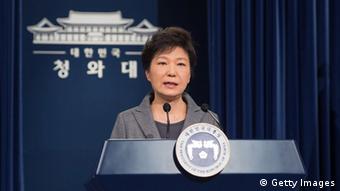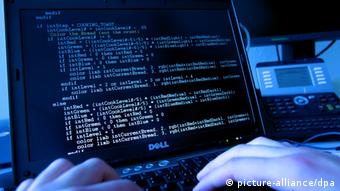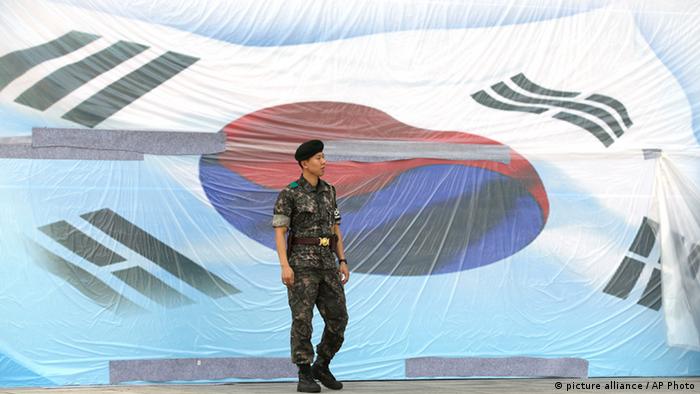'Politicized' South Korean spy agencies in 'urgent need of reform': ICG
South Korea's intelligence agencies are susceptible to failures, politicization and intervention in domestic politics, so reform is urgently needed to restore public confidence, analyst Daniel Pinkston tells DW.
The image of South Korea's intelligence services has been repeatedly tainted over the past years due to a series of scandals. But the situation worsened in the fall of 2012 when many in the main opposition party, the New Politics Alliance for Democracy - then named the Democratic Party, accused the country's National Intelligence Service (NIS) of swaying the outcome of the December presidential election through an Internet smear campaign against opposition candidate Moon Jae-in to ensure the victory of incumbent President Park Geun-hye. The public's trust and confidence in the intelligence community has been severely damaged ever since.
Daniel Pinkston, Deputy North East Asia Project Director at the International Crisis Group who co-authored a recently released report titled "Risks of Intelligence Pathologies in South Korea," says in a DW interview that intelligence in South Korea is sometimes being manipulated with the aim of influencing the policy-making process. This is done so that the decision-makers' choices are more aligned with the policy preferences of the intelligence agencies, thus creating risks for both the country and beyond, he adds.
DW: In your report you speak of risks of intelligence pathologies. What do you mean by that?
Daniel Pinkston: Scholars and analysts mostly cover two types of intelligence problems or "pathologies." These are "intelligence failure" and the "politicization of intelligence." There are several examples of "intelligence failure" such as Pearl Harbor and the 9/11 terrorist attacks. The failures can occur anywhere along the intelligence process: collection, processing, analysis, and distribution to consumers (policymakers).

Daniel Pinkston says that actions like Internet malfeasance during the 2012 presidential election, which saw Park Geun-hye reach power, distort the democratic process
Policymakers might receive an inferior or faulty intelligence report because the agency could not collect the data; or the data were collected, but were put aside or ignored during processing; or the analysts make analytical errors due to cognitive bias, faulty assumptions and/or bad models.
On the other hand, intelligence can become "politicized" if an intelligence agency distorts or filters reporting in a way that influences policy choices. A prime example would be the reports on the issue of weapons of mass destruction in Iraq: the then US Vice President Dick Cheney reportedly went to the CIA to "cherry pick" the data to fit the outcome he wanted to see.
To which extent are South Korea's spy agencies politicizing intelligence?
The report refers to the deliberate distortion of intelligence products - at some point in the processing of intelligence - to influence policy making. In other words, someone in the intelligence agency manipulates the intelligence with the aim of influencing the decision-maker's choices to be more aligned with his or her policy preferences. The Dick Cheney example above fits this description.
The report mentions that the intelligence capacity of the Republic of Korea (ROK) has, of late, shown a range of weaknesses and failures. What are these weaknesses?
Most of the processes in the ROK intelligence community work pretty well. However, they could do much better as there is an urgent need to acquire the sophisticated hardware and intelligence collection platforms to ensure that they have adequate early warning capabilities in the shadow of North Korea's rising nuclear and missile threats.
The country could also enhance intelligence sharing with the United States by doing a much better job at protecting classified information. When intelligence is leaked, the damage often is much greater than the simple disclosure of the information. Intelligence leaks will often tip off adversaries or competitors that somehow someone has gained access to information they wish to protect; therefore, they will take measures to deny that access. Due to South Korea's chronic leak problem, the US is reluctant to share some sensitive intelligence because of fears it will be compromised.
Are there any shortcomings in terms of staff training?
South Korea could do a better job ensuring that intelligence officers up to the senior levels are professional and qualified; promotions and appointments should be based on merit and not on school ties or friendships. For the most part, I think the latter is the case.
I believe the vast majority of the intelligence officers and analysts in the NIS and other ROK intelligence institutions are very professional and dedicated. However, recent scandals are a clear indication that the ROK intelligence community can do better.
In which ways have intelligence agencies intervened directly in domestic politics and why?
They have intervened independently or at the behest of state leaders to achieve their policy objectives. The Korea Central Intelligence Agency's kidnapping of Kim Dae-jung in the 1970s, and the Internet malfeasance during the 2012 presidential election campaign is another. These actions distort the democratic process, but of course, the degree of egregiousness varies. The Internet comments of 2012 are mild compared to kidnapping and election rigging, for example.
I believe the NIS is more constrained than ever, and the likelihood of direct intervention in domestic politics is lower than ever. However, the recent scandals show that the possibility has not completely disappeared. Hopefully, the recent events will lead to serious reflection and appropriate reform.

Pinkston says there is an urgent need for Seoul to acquire sophisticated hardware and software to ensure adequate early warning capacity, given North Korea's threats
What else should Seoul do to enhance its intelligence services?
I believe the South Korean intelligence community must regain the trust of South Korean citizens. This will take time, and all democracies struggle with this issue. In the wake of Edward Snowden's disclosure of the National Security Agency's surveillance activities, a debate has emerged regarding the right balance of state secrecy and citizens' right to privacy.
The tension between the NIS and South Korean society is slightly different because of the legacy under authoritarian rule, so South Koreans are quite sensitive to the problem of intelligence services intervening in domestic politics.
The default remedy for many has been the emasculation of the intelligence services, but now the country needs to increase its intelligence capacity given the multitude of security challenges posed by North Korea. So in sum, South Korea needs to increase its intelligence capabilities while at the same time introduce sufficient oversight as well as checks and balances to minimize the risk of intervention in domestic politics.
Daniel Pinkston is Deputy North East Asia Project Director at the International Crisis Group.




No comments:
Post a Comment